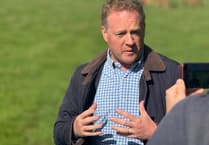As both Houses of Parliament gathered in Westminster Hall for the Presentation of Addresses to the new King, it was a poignant reminder of the unique role of our monarchy.
A solemn but striking occasion, with the full splendour of the State Trumpeters of the Household Cavalry, the King’s Body Guard of the Yeoman of the Guard, and the Honourable Corps of Gentlemen at Arms, it followed the Proclamation of the Accession made the day before.
In an age of instant electronic communication, the delivery of the Proclamation by word of mouth serves to remind us not only of the momentousness of the occasion, but that it is a personal message to each one of us.
The great political thinker Walter Bagehot described the constitution as being divided into two branches: the ‘dignified’ (the monarchy) and the ‘efficient’ (parliament, ministers and civil servants). Now, you can always argue about the efficiency of government, but the dignity of our monarchy has once again been marvelled upon by the whole world.
Of course we are not ‘ruled’ by our sovereign. But equally it would be a mistake to suppose the role of the monarchy is purely ceremonial or symbolic.
We are at once both a long-established and well-developed liberal democracy and a monarchy. Our constitutional monarchy is a precious thing. It sets us apart from other nations, and I believe firmly it has been and continues to be a great advantage for us.
It is something we don’t really think about much. But, as with all precious things, you have to know the value of what you have, and defend and protect it.
With the passing of Her late Majesty Queen Elizabeth and the accession of His Majesty King Charles, I hope over the coming months, we all can reflect on the value, not only of her service and his, but on the monarchy itself. In different ways, it would make a great topic of discussion at every level from our local primary schools, to book clubs, to adult education colleges, the WEA and U3A.
In our country, we have proved a monarchy need not be in tension with modern democracy but a bolster to it and a firm underpinning. The way the two ‘branches’ are intertwined gives a certainty and continuity to the political and administrative part.
The most prominent outward expressions of the principle are events like the King’s Speech to open a parliamentary session. As the Herald goes to press this week, MPs will be reaffirming allegiance to the new sovereign. Ministers are Ministers of the Crown. The Privy Council is His Majesty’s Privy Council. No Bill becomes an Act of Parliament until it has been given Royal Assent. And yet there is never any question about the primacy of the people, through their representative democracy. Indeed, the formalities that accompany the appointment of a new government or new prime minister, and the passing of laws, in a somewhat indefinable way make this all the more certain.
Although without direct political power, the monarch remains the apex of the constitution which, being unwritten, relies on convention, goodwill and personal responsibility. Being unwritten, but widely understood, also makes our constitution better able to evolve, as in a changing world it of course must.
The position of the monarch, and the respect with which the institution and individual are regarded, has often helped to maintain stability, closely entwined with long-standing norms and historic traditions. Overseeing the transfer of power between governments is just one example.
We’ve heard time and again over the past week about the quiet and valued counsel afforded by The Queen during the weekly audiences with her prime ministers. A time when issues could be discussed in privacy, with a monarch who had a unique perspective on events through time and right around the world.
The long reign of Queen Elizabeth very much defined the modern constitutional monarchy as we see it today.
The transition from Empire to Commonwealth was a major achievement. The Queen helped build a global community that has a common purpose which has been, and remains, immensely important.
Also important is the soft power and diplomacy of state visits, overseas tours and audiences with world leaders, helping to encourage trade, understanding and good relations with other nations. Nobody can host a state visit quite as Britain can.
As head of state, the monarch remains above politics, someone who unites rather than divides.
This unique position brings patronage to many great causes, helping to support and publicise the work of charities, foundations and community groups. This is a function of course maintained not only by the sovereign but by others in the royal family. Institutions like the Prince’s Trust have done enormous amounts of good work.
The Queen’s reign has been most appreciated for its commitment to public service, the ideals of which many politicians aspire to and are in turn measured by.
Decency, trustworthiness and honesty, selflessness and duty are all key tenets of service in public life, and in celebrating The Queen’s life it has reminded us all of their importance.
The Queen stepped forward at times both difficult and joyous for our country, but above all she remained true to the values of our constitutional monarchy.
We were fortunate to have had such a remarkable custodian of it for so long. Her funeral was a fitting tribute that moved countless millions across the world.
I am sure that you, like me, will never forget it, and certainly we will never forget her.





Comments
This article has no comments yet. Be the first to leave a comment.